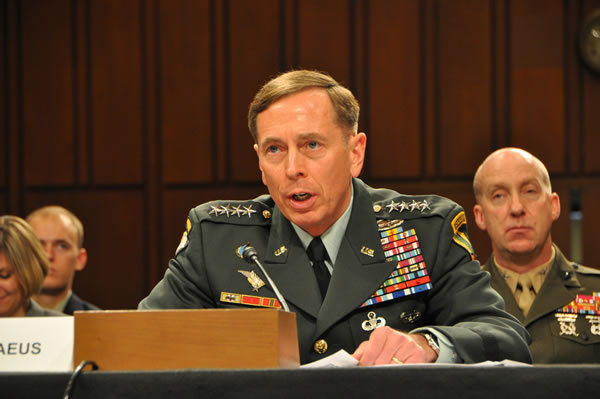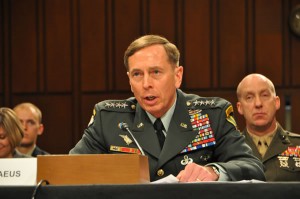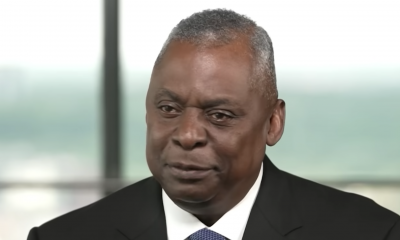National
Could Pentagon’s ‘Don’t Ask’ review hinder repeal?
Petraeus suggests outcome ‘could go in either direction’

As the top U.S. commander overseeing operations in Iraq and Afghanistan expressed support Tuesday for reconsidering “Don’t Ask, Don’t Tell,” he noted the Pentagon study currently underway could offer a positive or negative take on open service.
Following his initial remarks on “Don’t Ask, Don’t Tell,” Gen. David Petraeus, commander of U.S. Central Command, made the remarks to the Senate Armed Services Committee on the possible outcome of the study.
Chairman Carl Levin (D-Mich.) asked Petraeus to confirm he said earlier in Levin’s office that the study could show repeal’s “likely effects could go in either direction.”
“I believe you told me — either negative or positive, the study could show,” Levin said.
Petraeus affirmed that he made those remarks, saying, “It could. It could. Yes, sir.”
Asked by DC Agenda to clarify this view of the study, Levin replied, “Yeah, in terms like the impact on recruitment, readiness — it could have a positive or negative — and that’s what he confirmed here.”
Petraeus didn’t talk to reporters after the hearing.
If the parameters of the study are to determine whether repeal would have a positive or negative impact — as opposed to examining the best way to implement repeal — it would be inconsistent with how Defense Secretary Robert Gates outlined the review in congressional testimony last month. At the time, Gates said the study would focus on implementing repeal and not whether it would be beneficial or harmful to the military.
“The question before us is not whether the military prepares to make this change, but how we best prepare for it,” he said. “We received our orders from the commander-in-chief and we are moving out accordingly.”
The nature of the study as described by Petraeus and Levin also raises questions about why President Obama, who campaigned on repeal of “Don’t Ask, Don’t Tell,” would authorize a review that could complicate repeal efforts.
But Kevin Nix, spokesperson for the Servicemembers Legal Defense Network, said he’s “confident” the working group will follow the directive outlined by Gates “to figure out how best to implement open service.”
“The Senate repeal bill gives the military plenty of additional time — well into 2011 — to look at how to transition while Congress moves to end the law in 2010,” Nix said.
Nathaniel Frank, author of “Unfriendly Fire” and research fellow for the Palm Center, a think-tank on gays in the military at the University of California, Santa Barbara, said the problem with the working group is that it could succumb to what he called “political expediency.”
Frank said “mounds of research” have already answered questions about the impact on open service in the military. If the group does its job well, Frank noted, the findings will be consistent with this research and discover “there will be no negative impact or that any impact will be negligible and manageable.”
“But if the group falls prey to political pressure to exaggerate the risks to readiness, that will be used by obstructionists to derail reform in Congress, and ultimately full repeal is up to Congress,” Frank said.
Although the study was outlined as a way to implement repeal, Frank said what Gates actually put in place was a “political process,” and Obama’s willingness to set it up “does raise concerns about a repeat of the failures of 1993.”
Whatever the focus of the study, Petraeus backed the review Tuesday during the hearing as the best way to approach “Don’t Ask, Don’t Tell” while saying the time has come to “consider a change.”
“I believe the time has come to consider a change to ‘Don’t Ask, Don’t Tell,’ but I think it should be done in a thoughtful and deliberative manner,” he said. “And that should include the conduct of the review that Secretary Gates had directed that would consider the views of the force by changing the policy.”
Petraeus initially asked for eight minutes to give a statement on “Don’t Ask, Don’t Tell” in response to a question from Sen. John McCain (R-Ariz.), but Levin denied him that opportunity, saying giving the general eight minutes would violate the rules by going over the time McCain was allotted for questioning.
Levin said another senator could devote their entire question-and-answer time for Petraeus so he could offer his longer statement, although no committee panel volunteered their time. At the end of the hearing, Levin said he would welcome the longer statement from Petraeus if he wanted to submit it as part of the record.
In response to Petraeus’ remarks, Nix said SLDN is awaiting the general’s eight-minute answer before weighing in on Petraeus’ position.
“We agree that open service is more than a sound byte,” Nix said. “The bottom line is our service members are professionals and they know how to bring about the change to open service.”
U.S. Supreme Court
Supreme Court to consider bans on trans athletes in school sports
27 states have passed laws limiting participation in athletics programs

The U.S. Supreme Court on Thursday agreed to hear two cases involving transgender youth challenging bans prohibiting them from participating in school sports.
In Little v. Hecox, plaintiffs represented by the ACLU, Legal Voice, and the law firm Cooley are challenging Idaho’s 2020 ban, which requires sex testing to adjudicate questions of an athlete’s eligibility.
The 9th U.S. Circuit Court of Appeals described the process in a 2023 decision halting the policy’s enforcement pending an outcome in the litigation. The “sex dispute verification process, whereby any individual can ‘dispute’ the sex of any female student athlete in the state of Idaho,” the court wrote, would “require her to undergo intrusive medical procedures to verify her sex, including gynecological exams.”
In West Virginia v. B.P.J., Lambda Legal, the ACLU, the ACLU of West Virginia, and Cooley are representing a trans middle school student challenging the Mountain State’s 2021 ban on trans athletes.
The plaintiff was participating in cross country when the law was passed, taking puberty blockers that would have significantly reduced the chances that she could have a physiological advantage over cisgender peers.
“Like any other educational program, school athletic programs should be accessible for everyone regardless of their sex or transgender status,” said Joshua Block, senior counsel for the ACLU’s LGBTQ and HIV Project. “Trans kids play sports for the same reasons their peers do — to learn perseverance, dedication, teamwork, and to simply have fun with their friends,” Block said.
He added, “Categorically excluding kids from school sports just because they are transgender will only make our schools less safe and more hurtful places for all youth. We believe the lower courts were right to block these discriminatory laws, and we will continue to defend the freedom of all kids to play.”
“Our client just wants to play sports with her friends and peers,” said Lambda Legal Senior Counsel Tara Borelli. “Everyone understands the value of participating in team athletics, for fitness, leadership, socialization, and myriad other benefits.”
Borelli continued, “The U.S. Court of Appeals for the Fourth Circuit last April issued a thoughtful and thorough ruling allowing B.P.J. to continue participating in track events. That well-reasoned decision should stand the test of time, and we stand ready to defend it.”
Shortly after taking control of both legislative chambers, Republican members of Congress tried — unsuccessfully — to pass a national ban like those now enforced in 27 states since 2020.
Federal Government
UPenn erases Lia Thomas’s records as part of settlement with White House
University agreed to ban trans women from women’s sports teams

In a settlement with the Trump-Vance administration announced on Tuesday, the University of Pennsylvania will ban transgender athletes from competing and erase swimming records set by transgender former student Lia Thomas.
The U.S. Department of Education’s Office for Civil Rights found the university in violation of Title IX, the federal rights law barring sex based discrimination in educational institutions, by “permitting males to compete in women’s intercollegiate athletics and to occupy women-only intimate facilities.”
The statement issued by University of Pennsylvania President J. Larry Jameson highlighted how the law’s interpretation was changed substantially under President Donald Trump’s second term.
“The Department of Education OCR investigated the participation of one transgender athlete on the women’s swimming team three years ago, during the 2021-2022 swim season,” he wrote. “At that time, Penn was in compliance with NCAA eligibility rules and Title IX as then interpreted.”
Jameson continued, “Penn has always followed — and continues to follow — Title IX and the applicable policy of the NCAA regarding transgender athletes. NCAA eligibility rules changed in February 2025 with Executive Orders 14168 and 14201 and Penn will continue to adhere to these new rules.”
Writing that “we acknowledge that some student-athletes were disadvantaged by these rules” in place while Thomas was allowed to compete, the university president added, “We recognize this and will apologize to those who experienced a competitive disadvantage or experienced anxiety because of the policies in effect at the time.”
“Today’s resolution agreement with UPenn is yet another example of the Trump effect in action,” Education Secretary Linda McMahon said in a statement. “Thanks to the leadership of President Trump, UPenn has agreed both to apologize for its past Title IX violations and to ensure that women’s sports are protected at the university for future generations of female athletes.”
Under former President Joe Biden, the department’s Office of Civil Rights sought to protect against anti-LGBTQ discrimination in education, bringing investigations and enforcement actions in cases where school officials might, for example, require trans students to use restrooms and facilities consistent with their birth sex or fail to respond to peer harassment over their gender identity.
Much of the legal reasoning behind the Biden-Harris administration’s positions extended from the 2020 U.S. Supreme Court case Bostock v. Clayton County, which found that sex-based discrimination includes that which is based on sexual orientation or gender identity under Title VII rules covering employment practices.
The Trump-Vance administration last week put the state of California on notice that its trans athlete policies were, or once were, in violation of Title IX, which comes amid the ongoing battle with Maine over the same issue.
New York
Two teens shot steps from Stonewall Inn after NYC Pride parade
One of the victims remains in critical condition

On Sunday night, following the annual NYC Pride March, two girls were shot in Sheridan Square, feet away from the historic Stonewall Inn.
According to an NYPD report, the two girls, aged 16 and 17, were shot around 10:15 p.m. as Pride festivities began to wind down. The 16-year-old was struck in the head and, according to police sources, is said to be in critical condition, while the 17-year-old was said to be in stable condition.
The Washington Blade confirmed with the NYPD the details from the police reports and learned no arrests had been made as of noon Monday.
The shooting took place in the Greenwich Village neighborhood of Manhattan, mere feet away from the most famous gay bar in the city — if not the world — the Stonewall Inn. Earlier that day, hundreds of thousands of people marched down Christopher Street to celebrate 55 years of LGBTQ people standing up for their rights.
In June 1969, after police raided the Stonewall Inn, members of the LGBTQ community pushed back, sparking what became known as the Stonewall riots. Over the course of two days, LGBTQ New Yorkers protested the discriminatory policing of queer spaces across the city and mobilized to speak out — and throw bottles if need be — at officers attempting to suppress their existence.
The following year, LGBTQ people returned to the Stonewall Inn and marched through the same streets where queer New Yorkers had been arrested, marking the first “Gay Pride March” in history and declaring that LGBTQ people were not going anywhere.
New York State Assemblywoman Deborah Glick, whose district includes Greenwich Village, took to social media to comment on the shooting.
“After decades of peaceful Pride celebrations — this year gun fire and two people shot near the Stonewall Inn is a reminder that gun violence is everywhere,” the lesbian lawmaker said on X. “Guns are a problem despite the NRA BS.”




















